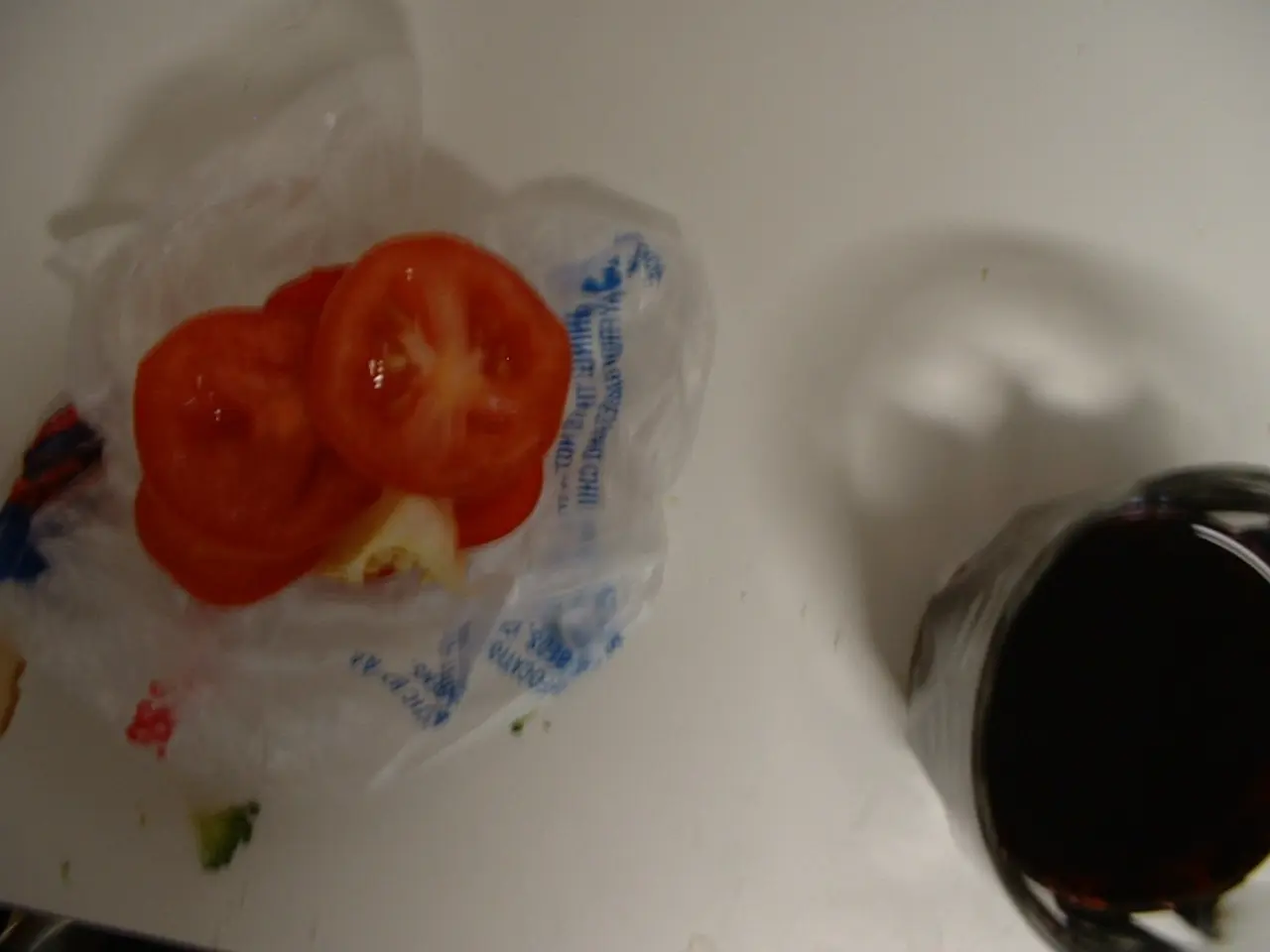Alleviating an Ulcerative Colitis Episode: A Guide
Managing Ulcerative Colitis Flare-ups: A Comprehensive Guide
Ulcerative colitis (UC), a type of inflammatory bowel disease (IBD), can be challenging to manage, especially during flare-ups. Here's a guide to help you navigate through these periods effectively.
Medication Adherence
Continuing prescribed treatments like aminosalicylates, immune system suppressors, biologics, and targeted synthetic small molecules during remission significantly reduces the risk of relapse. Discontinuing medications is linked to over 50% relapse rates[1].
Dietary Management
Avoiding known trigger foods such as dairy, gluten, spicy items, high-fiber vegetables, and processed meats can help prevent flare-ups and reduce symptoms. During flares, eating low-residue, easy-to-digest foods like broth, peeled or cooked fruits and vegetables, eggs, fish, and certain fermented dairy (unsweetened yogurt or kefir) supports symptom management[2][3].
Stress Reduction
Techniques such as mindfulness meditation, yoga, and deep breathing exercises can lessen stress, a factor known to exacerbate UC symptoms and trigger flares[2].
Regular Medical Monitoring
Routine checkups allow timely detection of inflammation or symptom changes, enabling early treatment adjustments[1].
Exercise and General Wellness
Moderate exercise improves overall health, may reduce inflammation, and supports mental well-being, which is beneficial in UC management[2].
During Flare-ups
Corticosteroids may be prescribed for moderate to severe flares, and dietary focus shifts toward gentle, low-residue foods to minimize bowel irritation while maintaining nutrition[3][4].
Lifestyle Modifications
Eating smaller and more frequent meals is easier on the gut and less likely to worsen symptoms during a flare-up. If symptoms reappear during or after a period of remission, it is referred to as a UC flare-up[5].
Stress Relief Strategies
Stress relief strategies, such as breathing exercises, rest, meditation, therapy, self-care, and relaxation techniques, may help stop flare-ups. If UC symptoms are severe, it is best to speak with a primary care physician or an IBD nurse for management strategies and possible medication prescriptions[6].
Dietary Considerations
Avoiding alcohol consumption, whether moderate or in excess, may help manage UC symptoms during flare-ups. A diet high in protein, particularly animal proteins, may increase the risk of IBD and flare-ups of symptoms. It is recommended to avoid greasy foods, fried foods, whole grains, and to keep a food journal to document symptoms after each meal[2][3].
Specific Case Study
Daisy Warner, a person with UC, follows the specific carbohydrate diet to prevent and manage flare-ups. This diet eliminates complex carbohydrates and focuses on foods rich in simple sugars and proteins[7].
Intermittent Fasting
Intermittent fasting may help improve gut function and inflammatory status, making it potentially useful for people with UC, particularly during flare-ups[8].
Exercise Benefits
Exercise may promote the release of endorphins, which can minimize symptoms. Exercise is beneficial for people experiencing a UC flare-up and for extending the time between flare-ups[9].
Professional Guidance
A doctor or registered dietitian can help a person create a diet plan that works for them. During a flare-up, people can try reducing their intake of high-fiber foods, including certain fruits and vegetables[2].
Recognising Warning Signs
Learning to recognize the warning signs of a UC flare-up can help reduce its severity. Symptoms include incontinence, fatigue, increased frequency of bowel movements, mucus in stools, abdominal pain, fever, weight loss, diarrhea, blood in the stool, body and joint aches, lack of appetite, and eye problems[10].
By combining these strategies tailored by a healthcare provider, you can effectively manage UC and reduce the severity of flare-ups.
[1] Kappelman MD, Hanauer SB. Inflammatory bowel disease. N Engl J Med. 2008;358(25):2729-2741. doi:10.1056/nejmra0708051
[2] Hanauer SB, Sandborn WJ. Ulcerative colitis. N Engl J Med. 2012;366(23):2221-2232. doi:10.1056/nejmra1110349
[3] Loftus EV Jr, Hanauer SB. Therapy for mild to moderate ulcerative colitis. N Engl J Med. 2012;366(23):2233-2244. doi:10.1056/nejmra1110350
[4] Sandborn WJ, Hanauer SB. Therapy for severe ulcerative colitis. N Engl J Med. 2012;366(23):2245-2258. doi:10.1056/nejmra1110351
[5] Hanauer SB, Sandborn WJ. Ulcerative colitis. N Engl J Med. 2012;366(23):2221-2232. doi:10.1056/nejmra1110349
[6] Sandborn WJ, Hanauer SB. Ulcerative colitis: an overview of current management strategies. Am J Gastroenterol. 2009;104(10):2222-2232. doi:10.1038/ajg.2009.325
[7] Warner D. The Specific Carbohydrate Diet for Ulcerative Colitis. Inflammatory Bowel Diseases. 2014;20(11):2231-2234. doi:10.1002/ibd.38431
[8] Staudacher HM, Schreiber S, Kaser A, et al. Effect of intermittent fasting on gut microbiota, permeability, and inflammation in obese mice. Cell Metab. 2014;20(4):500-510. doi:10.1016/j.cmet.2014.07.015
[9] Downey JM, Sandborn WJ. Exercise and ulcerative colitis. Gastroenterology. 2011;141(3):916-927. doi:10.1053/j.gastro.2011.06.025
[10] Hanauer SB, Sandborn WJ. Ulcerative colitis. N Engl J Med. 2012;366(23):2221-2232. doi:10.1056/nejmra1110349
- The established treatment entity for ulcerative colitis (UC) often includes medications like aminosalicylates, immune system suppressors, biologics, and targeted synthetic small molecules.
- Discontinuing prescribed treatments during remission can lead to over 50% relapse rates in UC.
- A diet free of trigger foods such as dairy, gluten, spicy items, high-fiber vegetables, and processed meats can help prevent UC flare-ups and reduce symptoms.
- Deep breathing exercises, mindfulness meditation, and yoga can lessen stress, a factor known to exacerbate UC symptoms and trigger flares.
- Maintaining regular checkups is crucial for timely detection of inflammation or symptom changes in UC, enabling early treatment adjustments.
- Moderate exercise can improve overall health, possibly reduce inflammation, and promote mental well-being, all beneficial in UC management.
- During flare-ups, corticosteroids may be prescribed, and the focus shifts toward gentle, low-residue foods to minimize bowel irritation while maintaining nutrition.
- Eating smaller and more frequent meals can be easier on the gut and less likely to worsen UC symptoms during a flare-up.
- Stress relief strategies like breathing exercises, therapy, self-care, and relaxation techniques may help stop UC flare-ups, and it's best to consult a primary care physician or an IBD nurse for management strategies and possible medication prescriptions during severe UC symptoms.
- A doctor or registered dietitian can help create a diet plan for people with UC, and during a flare-up, they may advise reducing the intake of high-fiber foods.




